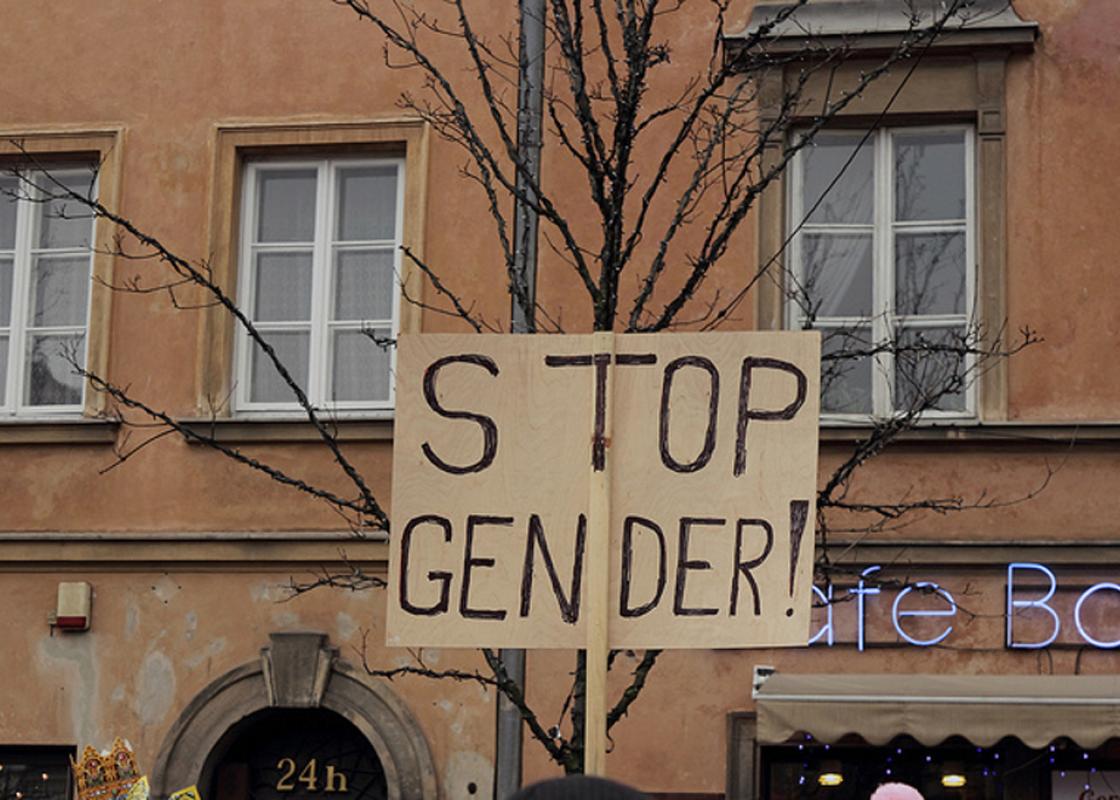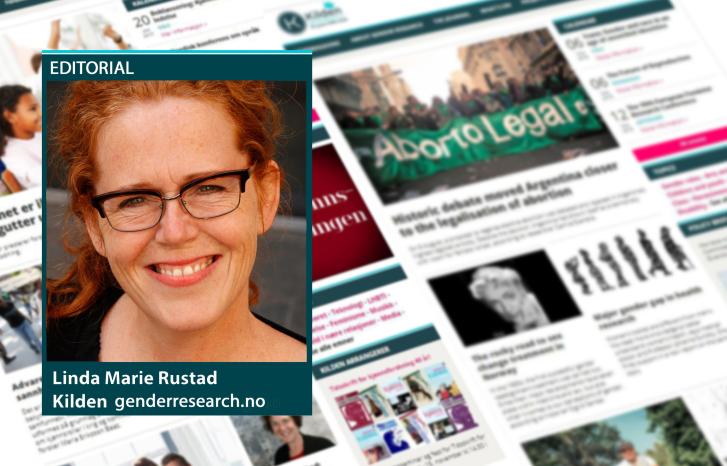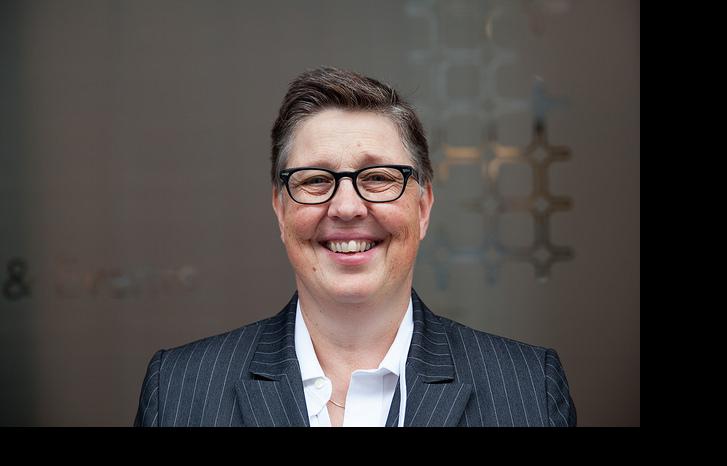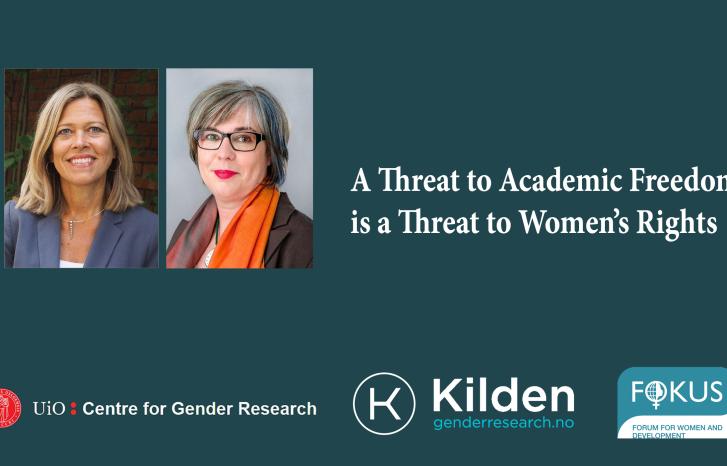Gender research is facing tough times in parts of Europe. In several countries, academics who work with feminist perspectives are worried about their career prospects. Institutions are being threatened, and the research field is encountering unfounded criticism in both large and more alternative media outlets.
In September, Kilden genderresearch.no met with researchers from five European countries during the 10th European Feminist Research Conference in Göttingen, Germany. All of them have actively disseminated research in their home countries. During the conference, we asked how the researchers should reach out to the general public when gender research itself is under attack. The most extreme example of this is the Hungarian government’s decision to discontinue gender studies at the country’s universities.
“This is the first time that an EU country is trying to prohibit a study programme. This sets a dangerous precedent,” says Marianna Szczygielska. She is a post-doc at the Max Planck Institute for the History of Science in Berlin, but completed both a master’s and Ph.D. degree at Central European University (CEU) in Budapest.
“Since the attack was against gender research, it affected only two institutions, but it infringes on academic freedom in general,” she says.
In addition to CEU, the public university ELTE has offered a master’s programme in gender studies. After 12 October, the programme is history. Students can no longer earn Hungarian credits in gender studies. But CEU is operated and funded by U.S. interests, not least with support from billionaire George Soros. As a result, Hungarian students can still learn about gender at CEU, but they will earn credits according to the U.S. system.
“Gender” is word of the year
Like Hungary, Poland has a far-right, populist government. The ruling Law and Justice (PiS) Party is certainly no proponent of gender research. Agnieszka Graff conducts research and lectures at the University of Warsaw, and is a prominent feminist voice in Polish media. In her opinion, researchers in Poland have been smart.
“We have never had a designated centre or department for gender research at a Polish university or the opportunity to get a master’s degree in gender studies,” she says.
In spite of this, there are many gender researchers in Poland, but they work at faculties and in departments dedicated to other fields. If you want to study gender, you must pay extra for those courses, and they are offered at different institutions.
“So the argument that this is the taxpayers’ money doesn’t hold water. It’s a shame, because it means that gender studies remain marginalized, but it’s also good for avoiding attack.”
Gender was the most googled and most discussed word in Poland
From 2012 to 2014, the extreme right-wing in Poland led an anti-gender campaign that negatively affected Polish gender researchers. In Poland, Hungary and other Eastern European countries, the English word “gender” is used to underscore that the research and feminist critique is a Western import.
“Gender was the most googled and most discussed word in Poland. The entire country had fun with it. However, many people were genuinely afraid that gender would harm their children. For instance, the campaign used photos of children who were terrified of being sexualized and of boys who were forced to wear dresses,” explains Graff.
It went so far that a Polish language council named “gender” the word of the year in 2013.
The campaign against gender was multi-faceted. According to Graff, a conservative organization compiled a blacklist of gender researchers.
“They contacted educational institutions and asked them who teaches in the field of gender studies and what they teach about. The institutions did not respond.”
Graff thinks the reason that the institutions did not respond was in order to defend the tradition of universities’ autonomy. This must not be confused with a defence of research freedom.
“The institutions have nothing against us being disciplined on the basis of ideology. But they want to do it themselves, not leave it to outsiders.”
The article continues below image.
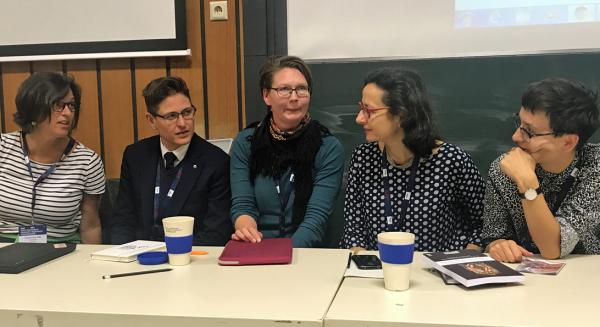
Opponents of gender research
Sweden is often held up as the leader in gender research. Rumours that kindergarten employees must use gender-neutral pronouns suggest that gender research enjoys good conditions. Kajsa Widegren, Research Coordinator at the Swedish Secretariat for Gender Research, confirms that this is the case.
“Gender research in Sweden has been institutionalized for a long time. But this also means that criticism of gender research has a long history,” she says.
There are two people in particular who write critical articles about gender research in the media. The first one calls himself a whistle-blower.

“Our oldest opponent is Bo Rothstein, a professor of political science. He attacks gender research in general, as well as us as an institution. He often criticizes research methods, especially when it comes to research on men's violence against women.”
One of those who has refuted Rothstein’s criticism is Jenny Westerstrand, a violence researcher who earlier this year published an analysis of the rhetoric in the debate between Rothstein and gender researchers in the Journal of Gender Research (Tidskrift för genusvetenskap). In her paper, she argues that Rothstein’s position as a political scientist gives him the “institutional authority” to say whatever he wants.
We end up with a discussion about ideology on the one hand and structures in the research sector on the other
“Rothstein misunderstands on purpose how methods are used in feminist research,” says Widegren.
“For example, he is highly critical of the fact that researchers who work with violence against women look for structures and don’t focus on the identity of the perpetrators.”
A younger critic is Ivar Arpi, a journalist and editorial writer for the daily newspaper Svenska Dagbladet.
“Last year he wrote several editorials on the ideology of gender research. He criticizes both our institution and gender research in general, and attacks the scientific validity of gender research. He therefore follows up Rothstein’s argument, but from a different position.”
The Swedish Secretariat for Gender Research responded to Arpi with an opinion piece in the daily newspaper Dagens Nyheter, in which they argued that it was his critique that was ideological. But Widegren is unsure of what comes from debates like this.
“Arpi never defines what he means by scientific validity, and neither did we. We end up with a discussion about ideology on the one hand and structures in the research sector on the other,” she says, and emphasizes that she misses an arena for discussing scientific perspectives and methods.
“I also want to ask: What do you mean by scientific? What arguments are used to determine when something is scientific and something is ideological? I actually think people are very interested in this question: What is knowledge?”
Defence risks undermining critical potential
What is the best defence against the attacks on gender research? Elisa A.G. Arfini teaches at the University of Bologna, conducts research at the University of Milan and coordinates a joint European project from their position in the organization Orlando. Arfini believes that researchers too easily resort to strategies to pacify critics and assurances that gender research is not dangerous.
“In the Italian debate, high-profile researchers have argued that gender research is normal research by referring to its scientific merit. They have pointed out that it is not ideology, but theory, and that it is not just one theory, but many theories. This is how they have tried to convey that there is nothing to worry about.”
“But perhaps there is cause for concern?”
Arfini notes that gender research is a critically oriented field that examines social structures that exclude and marginalize or that maintain norms and ideas about gender and sexuality.
“Researchers closer to the grassroots level have chosen to maintain this critical approach, and have said yes – we are dangerous. But this strategy has received very little attention in the Italian media, where the focus has been instead on internal conflicts. The relationship between academia and activism is complicated, and researchers with ties to grassroots activism have been accused of undermining the legitimacy of gender research.”
Sozialismus, fascismus – and genderismus
Germany hosted the European research conference which brought together about 500 researchers in September. Some of the large German universities have offered gender studies for many years, while other universities have institutionalized the gender dimension in other fields, especially in the social sciences, humanities and science studies. Paula-Irene Villa is a sociology professor at the University of Munich, and has kept a close eye on the numerous attacks against German gender researchers.
“I see a strong anti-intellectual and anti-reflexive tendency. In the critique of gender research, science becomes something primitive and positivistic, an idea that science will solve problems such as cancer and water shortages.”
The criticism also mobilizes anti-elitist and anti-academic feelings
The opponents of gender research use the term genderismus in German (“genderism” in English). The “ismus” ending suggests that the research embraces a totalitarian ideology, like sozialismus (socialism) or fascismus (fascism).
“The rhetoric mobilizes a wide range of feelings: anti-cosmopolitan, anti-transnational, anti-liberal, anti-intellectual and anti-EU and -Europe. Genderismus has become a symbol that unites many groups. The discourse also has racist and nationalistic textures built into it, and plays on the German self-image that we have to feed the world, especially countries like Greece. And that the EU wastes our tax money on minorities and powerful lobbies, such as the 'gay lobby'.”
She sees that the criticism of gender research comes from both the right and left in politics.
“The criticism also mobilizes anti-elitist and anti-academic feelings. In this case, gender research is presented as part of an international project, disconnected from the real problems of real people. The left often criticizes Judith Butler’s theories and queer research for precisely this.”
YouTube or state-controlled media
How can researchers disseminate critical analyses when the media is not free?
“When the media is controlled by the state, there are not many places you can say what you want,” says Marianna Szczygielska about Hungary.
There are also few media outlets to choose from in Poland, but Agnieszka Graff explains that the researchers have worked strategically to reach the general public.
“We are a group of feminists who are experts in our fields and who are easily accessible to the media. We have reached out to friendly journalists who use us as sources.”
They were contacted when the media covered a story about a poor family who had to survive without child maintenance.
“It is men who don’t pay child maintenance. We could explain that in the Polish context this is associated with masculinity and men’s sense of entitlement. In this case, we took a feminist perspective on a topic that is important to a large number of people.”
In addition, Graff and her Polish colleagues have become YouTube stars.
“We reacted to media debates where men-only panels discussed women’s topics. It’s not only outrageous but funny as well – so we came up with an idea.”
They created a series of mock debates where a panel consisting of only women discuss topics such as a prohibition against Viagra, criminalization of masturbation and the advantages of female violence against men.
“The series became very popular, also among right-wing trolls. I’m recognized on the streets now, more for this than for the books I’ve written.”
Graff emphasizes that doing stunts like this is slightly different from disseminating research.
“But it has to do with making people aware of the absurdities in patriarchal knowledge production and dissemination where men know everything and women aren’t allowed to get a word in,” she says.
Watch an episode of the YouTube series Krytyka Polityczna, in which Polish journalists and gender researchers make fun of male-dominated media debates:
Discuss gender of their own terms
Paula Villa makes it clear that there are huge differences between the European countries and that researchers must adapt the form and content of what they communicate to the context they are in. She, herself, often stands up to trolls on Facebook.
“When people comment that gender researchers are like a cancer that just grows and grows or that we are killing other disciplines because we are stealing their funding, then I respond. It might not have much of an impact, but I want to stand up and say ‘Hey, it’s me – the cancer’,” she says.
She believes that gender researchers must stop defending themselves and instead show that they are a natural part of a modern knowledge society.
“In Germany, many researchers says that they ‘gender’ a context or a topic, for example, where the gender dimension has not been common. But actually, everything is already gendered. What we do is look more closely at how and why it is interesting. It’s as simple as this: Gender is already important.”
When we are under pressure, we should stand up for what our research field actually works with
Villa also encourages the universities to defend gender research on the basis of its own logic, and not on the right-wing’s logic.
“These institutions must defend us against all attacks on academic freedom. They don’t need to say that they want to have gender research or that gender research is good enough. But the universities must stand up for the importance of having an arena for intellectual debate about what knowledge is, what critique is, and what society is.”
She gets support from Szczygielska, who emphasizes that the right-wing’s market logic is a pitfall.
“I don’t think we should defend ourselves against the arguments used against gender research by saying that ‘oh yes, you can get a job after you graduate’ or assert that we are useful. When we are under pressure, we should stand up for what our research field actually works with. Say that it includes queer studies, trans studies, crip studies, and so on. We must be careful so that we don’t undermine our field because we don’t dare to show all of its various niches.”
Translated by Connie Stultz.
